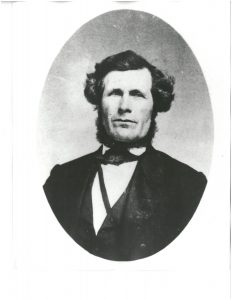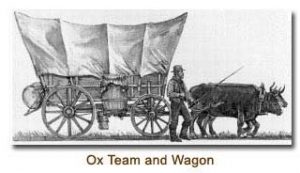Joel Palmer: Pioneer Provisioner in British Columbia
By guest blogger Ken Mather, author of several books on pioneer and ranching history, including Trail North, Ranch Tales and the most recent Stagecoach North. Ken has worked in curatorial, management and research positions at Hat Creek Ranch, Historic O’Keefe Ranch and Barkerville.
J oel Palmer was born in Upper Canada in 1810 but at the outbreak of the War of 1812, his family moved to New York. By 1845, he was living comfortably in Indiana and serving as a Democratic representative in the Indiana legislature. His comfort, and perhaps his boredom, was stirred when he heard of the potential of the Oregon Country. He left his family behind and joined a wagon train heading along the Oregon Trail. Upon reaching Oregon, he decided that this was where he wanted to spend the rest of his life. He took up land in the lush Willamette Valley and then headed back to Indiana for his family. Together they travelled by wagon over the Oregon Trail and Palmer was elected “captain” of the wagon train. Shortly after his arrival, war broke out between the immigrants and the Cayuse Indigenous People. Already having a reputation for organization and integrity, Palmer was appointed commissary general for the volunteer troops that went to do battle. He was referred to as General Palmer ever after.
oel Palmer was born in Upper Canada in 1810 but at the outbreak of the War of 1812, his family moved to New York. By 1845, he was living comfortably in Indiana and serving as a Democratic representative in the Indiana legislature. His comfort, and perhaps his boredom, was stirred when he heard of the potential of the Oregon Country. He left his family behind and joined a wagon train heading along the Oregon Trail. Upon reaching Oregon, he decided that this was where he wanted to spend the rest of his life. He took up land in the lush Willamette Valley and then headed back to Indiana for his family. Together they travelled by wagon over the Oregon Trail and Palmer was elected “captain” of the wagon train. Shortly after his arrival, war broke out between the immigrants and the Cayuse Indigenous People. Already having a reputation for organization and integrity, Palmer was appointed commissary general for the volunteer troops that went to do battle. He was referred to as General Palmer ever after.
In 1858, Palmer saw the gold rush in British Territory north of the Forty-ninth Parallel as an opportunity for his beloved Oregon to become the supply centre for the gold fields. Since he was familiar with wagons, he decided to organize a party consisting of twenty wagons loaded with provisions and mining equipment, along with about a hundred miners and adventurers as well as several pack trains and a few dozen beef cattle. The party made their way north from Walla Walla and crossed the Columbia River at the mouth of the Okanogan River, rolling each large freight wagon onto two canoes to ferry them across. Palmer sent ahead a party to cut out a road to accommodate the wagons and at one point constructed rafts to carry the wagons across Okanagan Lake to avoid rough country.
When he reached Fort Kamloops, he decided to abandon the wagons and use pack trains to move his goods further. His provisions, including 4000 pounds of flour, sold well and it was reported in the Oregon Statesman, “The provisions taken up by him had been sold at remunerative rates; his mining implements were a total loss, there being no sale for that class of wares.”[1]
The following year, Palmer assembled large quantities of provisions and headed north again, this time with mostly pack trains, having found the wagons to be difficult. That spring, a reporter from the Victoria British Colonist wrote from Lillooet,
“This place has completely run out of everything eatable by the number of men coming down for stores. If I had been a trader and brought with me 20,000 pounds of bacon and 20,000 pounds of flour I could have got rid of the bacon by breakfast and had an empty house by dinnertime. Some men have been here for a fortnight and not been able to get their supplies yet.”[2]
When Palmer arrived, he sold everything he had and, by August was back in Portland purchasing more supplies.
The demand for provisions, especially foodstuffs, continued and Palmer supplied a network of stores extending as far as the Cariboo. In October, the Colonist reported:
“Goods are reported scarce on the upper Fraser and mule trains eagerly looked for by the hardy miners who anxiously desire to lay in a supply of provisions for the winter. Want of mules effectively stops a supply of provisions being packed into the upper country this season. Hence fear of starvation has induced some to leave $11 diggings and go down to Victoria, expecting to return to the mines early in the Spring. A considerable amount of vegetables has been raised on the Lillooet route, and will prove invaluable to the miners, preventing scurvy… Gen. Palmer had arrived with his train from the Dalles, Oregon.”[3]
The following year of 1860 saw Palmer once again in the vanguard of the mining frontier. In June, a Colonist reporter, “met General Palmer from Oregon with one hundred and twenty-five mules, all heavily laden with miners’ supplies, which he intends retailing to the miners at more moderate rates, than they have ever been before, which is refreshing news to those who had the fortitude to remain during the late panic of high prices. In connection with the provision train, he has one hundred and fifty head of beef in such fine condition that the eye of the epicure would get feasted upon them before tasting the juicy beefsteak that will soon be served out from them. Plenty of cheap provisions is just what is required at present, in order to encourage and enliven the somewhat dispirited individuals who are still lingering on in order that something may turn up.”[4]
Early in 1860 season, Palmer had written a long letter to the Oregonian newspaper, describing the route and its advantages. His letter listed the prices of basic provisions at Fort Alexandria in 1859: flour, beans, rice at 43 to 50 cents a pound; bacon 65 to 75 cents; sugar 55 to 65 cents; coffee 60 to 70 cents; tea $1.50 to $2.00; tobacco $1.50 per pound; brandy and whisky rate at four dollars a bottle “but these last named articles cross too many streams on their long journey to do much harm to the consumer.”[5] A look through the large collection of Joel Palmer papers in various archives reveals some of the other provisions that he carried: dried apples and pears, peas, wheat, butter, cheese, kegs of cider, and boiled cider.
Palmer also lists “desiccated vegetables,” a mixture of some or all of potatoes, cabbage, turnip, carrots, parsnips, beets, tomatoes, onions, peas, beans, lentils and celery. They had been used since the Crimean war and were prepared by cutting the fresh vegetables into thin slices and subjecting them to a very powerful press. This removed the juice and left a solid cake, which, after having been thoroughly dried in an oven, became almost as hard as a rock. A small piece of this, about half the size of a person’s hand, when boiled, would swell up so as to fill a vegetable dish. Their quality was dependent upon their preparation and their storage.
Joel Palmer made his last trip into British Columbia in the spring of 1861 and travelled all the way to Quesnelle Forks and Antler Creek. But just as he was poised to be one of the first onto the richest of the Cariboo creeks, he became discouraged, sold all his supplies at discount prices and returned to Oregon. It would be four years before the completion of the Cariboo Road would render the route of travel through the Okanagan Valley obsolete for anything but cattle.
[1] Oregon Statesman, November 30, 1858.
[2] British Colonist, June 23, 1859.
[3] British Colonist, October 21, 1859.
[4] British Colonist, June 26, 1860.
[5] Oregonian, January 28, 1860.

